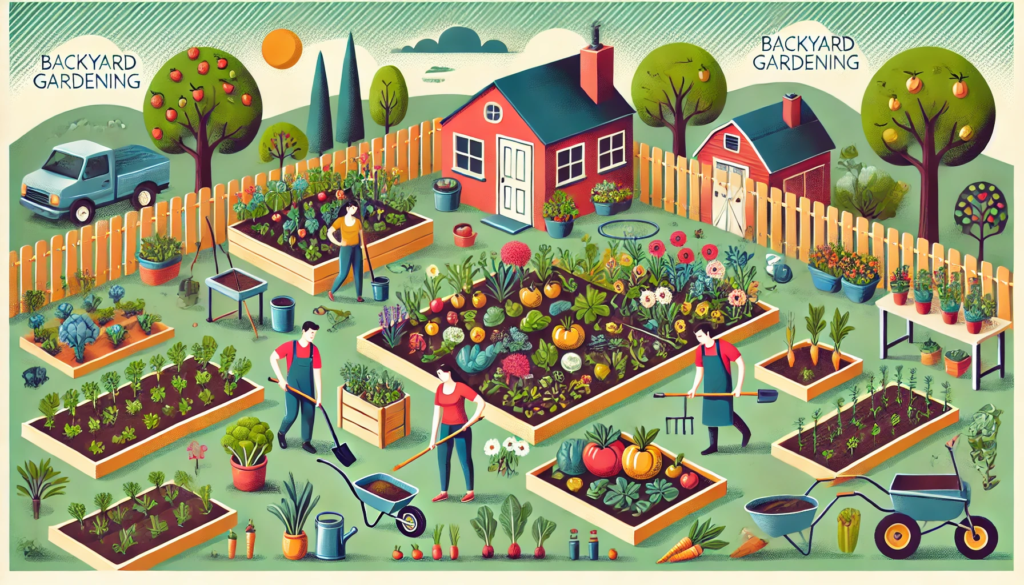Backyard gardening is a fulfilling and beneficial activity that has gained popularity among individuals, families, and communities. It involves growing fruits, vegetables, herbs, and flowers in one’s backyard, offering a range of physical, mental, environmental, and financial benefits. This comprehensive guide explores the numerous advantages of backyard gardening and provides insights into how it can improve your quality of life.
Physical Health Benefits
1. Improved Physical Fitness
Gardening is an excellent form of physical exercise that engages various muscle groups and promotes overall fitness.
- Cardiovascular Health: Activities such as digging, planting, weeding, and watering increase heart rate and improve cardiovascular health.
- Strength and Flexibility: Lifting soil, carrying water cans, and bending to plant seeds enhance muscle strength and flexibility.
- Calorie Burning: Gardening can burn a significant number of calories, helping with weight management. For example, an hour of light gardening can burn approximately 200-400 calories.
2. Better Nutrition
Growing your own fruits and vegetables ensures a fresh and nutritious supply of produce.
- Fresh Produce: Homegrown vegetables are often fresher and more nutrient-dense than store-bought ones, which may lose nutrients during transportation and storage.
- Variety: You can grow a variety of produce that might not be readily available in stores, adding diversity to your diet.
- Control Over Growing Conditions: You have control over soil quality, water, and fertilizers, ensuring your plants are grown in optimal conditions without harmful chemicals.
3. Enhanced Immune System
Exposure to soil and its microbes can boost your immune system.
- Vitamin D: Spending time outdoors in the sun helps your body produce vitamin D, essential for immune function.
- Soil Microbes: Interaction with beneficial soil microbes can enhance immune health and reduce inflammation.
Mental Health Benefits
1. Stress Reduction
Gardening is a natural stress reliever that helps reduce anxiety and promote relaxation.
- Mindfulness: Engaging in gardening tasks can be meditative, promoting mindfulness and relaxation.
- Cortisol Levels: Gardening has been shown to lower cortisol levels, the body’s primary stress hormone, thereby reducing stress.
2. Improved Mood
Spending time in nature and nurturing plants can significantly enhance mood and emotional well-being.
- Endorphin Release: Physical activity and exposure to nature stimulate the release of endorphins, the body’s feel-good hormones.
- Sense of Accomplishment: Successfully growing and harvesting plants provides a sense of achievement and satisfaction.
3. Cognitive Benefits
Gardening stimulates cognitive functions such as problem-solving, planning, and memory.
- Memory Retention: Engaging in gardening activities can improve memory retention and cognitive function.
- Problem-Solving Skills: Dealing with gardening challenges, such as pest control and plant diseases, enhances problem-solving abilities.
Environmental Benefits
1. Promoting Biodiversity
Backyard gardens contribute to local biodiversity by providing habitats for various plants, insects, and animals.
- Pollinator Support: Gardens attract pollinators such as bees, butterflies, and birds, essential for plant reproduction.
- Habitat Creation: Gardens provide habitats for beneficial insects, birds, and small animals, supporting local ecosystems.
2. Sustainable Practices
Gardening promotes sustainable practices such as composting, water conservation, and organic farming.
- Composting: Recycling kitchen and garden waste into compost enriches the soil naturally, reducing the need for chemical fertilizers.
- Water Conservation: Using rain barrels, drip irrigation, and mulching conserves water and promotes efficient water use.
3. Climate Change Mitigation
Gardening can help combat climate change by sequestering carbon dioxide, reducing greenhouse gas emissions, and promoting sustainable land use.
- Carbon Sequestration: Plants absorb carbon dioxide, reducing the overall carbon footprint.
- Reduced Transport Emissions: Growing your own food reduces the need for transportation, lowering greenhouse gas emissions.
Social Benefits
1. Community Engagement
Gardening can foster a sense of community by bringing people together.
- Community Gardens: Shared garden spaces promote collaboration and community building.
- Social Interaction: Gardening provides opportunities to meet and interact with neighbors and fellow gardeners, strengthening social bonds.
2. Educational Opportunities
Gardening is an excellent educational tool for children and adults alike, offering hands-on learning experiences about biology, ecology, nutrition, and sustainability.
- Educational Programs: Schools and community centers can use gardens for educational programs and workshops, teaching valuable life skills.
- Lifelong Learning: Gardening encourages continuous learning and curiosity about nature and the environment.
3. Family Bonding
Gardening can be a family activity, fostering teamwork and bonding among family members.
- Shared Activities: Families can work together on planting, watering, and harvesting, creating shared experiences and memories.
- Learning Together: Parents and children can learn about plants and nature together, promoting mutual understanding and cooperation.
Financial Benefits
1. Cost Savings
Growing your own food can significantly reduce grocery bills.
- Reduced Grocery Bills: Homegrown produce reduces the need to purchase fruits and vegetables, leading to cost savings.
- Self-Sufficiency: Growing your own food promotes self-sufficiency and reduces reliance on commercial food sources.
2. Home Value Enhancement
A well-maintained garden can increase the aesthetic appeal and value of your property.
- Curb Appeal: Attractive gardens enhance the visual appeal of your home, making it more appealing to potential buyers.
- Property Value: Well-designed gardens can increase the market value of your property, offering a good return on investment.
Practical Tips for Starting a Backyard Garden
1. Plan Your Garden
- Assess Space: Determine the size and location of your garden based on available space and sunlight.
- Choose Plants: Select plants that are suitable for your climate and soil conditions.
- Design Layout: Plan the layout of your garden, considering the needs of different plants and ensuring adequate spacing.
2. Prepare the Soil
- Soil Testing: Test your soil to determine its pH and nutrient levels.
- Amend Soil: Add compost, manure, or other organic matter to improve soil fertility and structure.
- Mulch: Use mulch to retain moisture, suppress weeds, and regulate soil temperature.
3. Planting and Maintenance
- Planting: Follow proper planting techniques for seeds and seedlings, considering spacing and depth.
- Watering: Ensure consistent watering, especially during dry periods, to keep the soil moist but not waterlogged.
- Weeding: Regularly remove weeds to prevent competition for nutrients and water, using tools like hoes or hand trowels.
4. Pest and Disease Management
- Integrated Pest Management (IPM): Use a combination of cultural, biological, and mechanical methods to manage pests.
- Organic Solutions: Use organic pesticides and natural predators to control pests.
- Monitor Plants: Regularly inspect plants for signs of pests and diseases, taking action early to prevent spread.
5. Harvesting and Enjoying
- Timing: Harvest produce at the peak of ripeness for the best flavor and nutrition.
- Preservation: Learn preservation techniques such as canning, freezing, and drying to enjoy your harvest year-round.
- Sharing: Share excess produce with neighbors, friends, and local food banks, fostering community and reducing waste.
Conclusion
Backyard gardening offers a multitude of benefits that extend far beyond the simple joy of growing plants. From improving physical and mental health to promoting environmental sustainability and fostering social connections, gardening is a rewarding activity that enriches our lives in numerous ways. Whether you are a seasoned gardener or a beginner, the advantages of backyard gardening are plentiful and transformative. By investing time and effort into creating and maintaining a garden, you can reap the rewards of a healthier, happier, and more sustainable lifestyle.
FAQs
What are the main benefits of backyard gardening?
Backyard gardening offers numerous benefits, including improved physical fitness, better nutrition, enhanced immune system, reduced stress, improved mood, cognitive benefits, environmental sustainability, community engagement, educational opportunities, family bonding, cost savings, and increased home value.
How can backyard gardening improve physical health?
Gardening provides physical exercise that engages various muscle groups, promotes cardiovascular health, improves strength and flexibility, and helps with weight management. It also provides access to fresh, nutrient-dense produce that supports a healthy diet.
How does gardening benefit mental health?
Gardening reduces stress, promotes relaxation, enhances mood, and provides a sense of accomplishment. It also stimulates cognitive functions such as problem-solving, planning, and memory, contributing to overall mental well-being.
What environmental benefits does backyard gardening offer?
Backyard gardening promotes biodiversity, supports pollinators, conserves water, reduces greenhouse gas emissions, and encourages sustainable practices such as composting and organic farming.
How can backyard gardening foster community and social connections?
Gardening can bring people together through community gardens and social interactions with neighbors and fellow gardeners. It provides opportunities for educational programs, family bonding, and shared activities that strengthen social bonds and foster community engagement.



